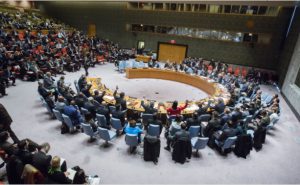DISARMAMENT & SECURITY .
An article from The UN News Centre
Expressing concern over the threat of terrorism and the risk that non-State actors may acquire or use nuclear, biological or chemical weapons, the United Nations Security Council today [15 December 2016] called on all countries to establish national controls to prevent proliferation of such weapons as well as their means of delivery.

In a resolution adopted today, the 15-member Council also reiterated the need to continue to strengthen ongoing cooperation among various intergovernmental bodies and entities concerning terrorist groups such as Al-Qaida, the Islamic State of Iraq and the Levant (ISIL/Da’esh), as well as counter-terrorism, through enhanced information sharing, coordination and technical assistance.
The Council further called on all UN Member States to ensure the full implementation of its resolution 1540 (2004) on non-proliferation of weapons of mass destruction.
It also called for strengthening the UN Trust Fund for Global and Regional Disarmament Activities through additional funding so that it is able to better assist countries in implementing their obligations under resolution 1540. . . .
STATEMENT BY JAN ELIASSON
Prior to today’s adoption of resolution by the Council, Deputy-Secretary-General Jan Eliasson issued the following statement:
Mr. President of the Security Council, Mr. Minister, I am extremely grateful for your generous and warm words. I thank the Security Council and the Spanish Presidency for arranging today’s debate. I am honoured to be here before you today in what is my final appearance at the Security Council. Let me take this opportunity to thank all of your for your friendship and cooperation over the past almost five years. I have highly treasured our dialogue and many professional and personal exchanges.
I also want to thank the Resolution 1540 Committee and its Panel of Experts, under the leadership of Ambassador Roman Oyarzun, for their work on the important subject under consideration today.
Preventing non-state actors from acquiring and using weapons of mass destruction is among the most important responsibilities of the international community.
The Nuclear Security Summits, the International Convention on the Suppression of Acts of Nuclear Terrorism and the close engagement by this Council on allegations of chemical weapon use have all played an important role in keeping us safe.
The Secretariat has also played its part.
In 2012, the Secretary-General convened a high-level meeting to strengthen legal frameworks against nuclear terrorism.
And after the accident at Fukushima, he chaired a high-level event to emphasize the connection between nuclear safety and security.
In 2013, he launched the investigation into the use of chemical weapons in the Syrian Arab Republic.
Yet in our rapidly evolving global security environment, gaps will continue to open.
We have seen the rise of vicious non-state groups with no regard for human life. They actively seek weapons of mass destruction I am sure. And these weapons are increasingly accessible.
(Continued in right column)
What is the United Nations doing for a culture of peace?
(Continued from left column)
We have seen this in the use of chemical weapons by Da’esh in Syria and Iraq.
There are legitimate concerns about the security of large stockpiles of weapons-usable fissile material outside international regulation.
Scientific advances have lowered barriers to the production of biological weapons. And emerging technologies, such as 3D printing and unmanned aerial vehicles, are adding to threats of an attack using a WMD.
We must also beware of the growing nexus between WMDs, terrorism and cyber security.
Malicious actions in cyberspace have real world consequences.
Non-state actors already have the capacity to abuse cyber technologies to create mass disruption.
The nightmare scenario of a hack on a nuclear power plant causing uncontrolled release of ionizing radiation is growing.
To stay ahead of this technological curve, the international community needs robust defences that are nimble and flexible.
Preventing a WMD attack by a non-state actor will be a long-term challenge that requires long-term responses.
Tools such as Resolution 1540 need to be fit for purpose.
I am pleased to see the Comprehensive Review, which has called for greater efforts to build the capacity of all States.
After all, this is a threat to our collective security.
We all need to boost our ability to respond.
A biological attack would be a public health disaster.
Yet there is no multilateral institutional response capability.
The Council also has a role to play in holding those that use chemical or other inhumane weapons accountable.
There can be no impunity.
This is a complex web of global threats and risks that requires a sophisticated global response.
We must take advantage of every opportunity to strengthen our collective defences.
In this regard, the Biological Weapons Convention Review Conference was in many ways disappointing.
I count on all States to work together to prevent potential disasters.
And I count on this Council to lead.
In closing, let me emphasize that it is not simply a case of letting these weapons fall into the wrong hands.
There are no right hands for wrong weapons.
And weapons of mass destruction are simply wrong.
There is only one sure way to prevent terrorists from acquiring weapons of mass destruction – that is their complete elimination.
We live in a world that is over armed.
A world where peace is under-funded.
I urge on behalf of the Secretary-General Ban Ki-moon all States to fulfil their commitment to building a world free of all weapons of mass destruction.
Thank you Mr. President.